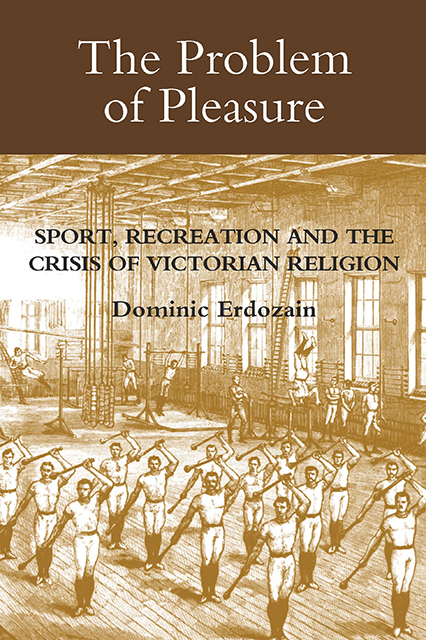Book contents
- Frontmatter
- Contents
- List of Illustrations
- Acknowledgements
- Abbreviations and Note on Conventions
- Introduction
- 1 ‘Born Free and Everywhere in Chains’: Evangelicalism and the Problem of Pleasure
- 2 Romanticism With Boots on: The Virtues of Sport
- 3 Renegotiating the Secular: The Coming of Recreation to the Mid-Victorian Religious World
- 4 ‘We are all Cyclists Now’: Applying the Pleasure Principle
- 5 Sport and the Secularisation of Late-Victorian Youth Ministry
- 6 Contesting the Sacred: The Late-Victorian Church and the ‘Gospel of Amusement’
- Conclusion
- Bibliography
- Index
6 - Contesting the Sacred: The Late-Victorian Church and the ‘Gospel of Amusement’
Published online by Cambridge University Press: 02 March 2023
- Frontmatter
- Contents
- List of Illustrations
- Acknowledgements
- Abbreviations and Note on Conventions
- Introduction
- 1 ‘Born Free and Everywhere in Chains’: Evangelicalism and the Problem of Pleasure
- 2 Romanticism With Boots on: The Virtues of Sport
- 3 Renegotiating the Secular: The Coming of Recreation to the Mid-Victorian Religious World
- 4 ‘We are all Cyclists Now’: Applying the Pleasure Principle
- 5 Sport and the Secularisation of Late-Victorian Youth Ministry
- 6 Contesting the Sacred: The Late-Victorian Church and the ‘Gospel of Amusement’
- Conclusion
- Bibliography
- Index
Summary
… as some to church repair, Not for the doctrine, but the music there.
(Alexander Pope)
Murmurings of Dissent
All the major denominations subscribed to the pleasure principle in some degree. The Congregationalists and the Church of England were to the fore but the new, ‘aggressive’ Methodism was deeply committed to it, and many Baptist ministries employed recreation in various forms. The gathering storm of protest was no ritualised indictment of the liberals. Predictably, the Baptists provided the strongest critique, but they were by no means alone. A feeling that recreation was not delivering on its promises was widely shared around 1890. Some of the objections came from long-time critics but the more telling ones came from people who recognised the legitimacy of recreation – welcomed it even – but now feared that it was dominating church life. We have witnessed the centrality of recreation to nineteenth-century ‘mission’, and how youth ministries were thus reconstituted on a holistic basis. What is remarkable about the ecclesiastical history of the period is how far churches themselves followed the pattern – emerging as multi-pronged leisure providers; probing the dark cities not with Burns and Keats but with boxing and cricket.
The metamorphosis of a lay institution like the YMCA into an increasingly secular ethos may not strike the reader as the unravelling of Christendom. Yet the YMCA was not only a symbol of nineteenth-century voluntarism in its diversity, it was increasingly a model for churches as such. What is striking about the ecclesiology of the period, as scholars like Yeo and Green have noted, is the convergence and commonality that emerged from the deregulated conditions of ‘denominationalism’. The collapse of the confessional state empowered churches to organise and operate as they wished, yet the power of their social thought guided them towards an extraordinary unity of principle. Chapels increasingly resembled churches, and both resembled YMCAs. Matters had come full circle when a local paper described the YMCA in 1905, ‘as a kind of institutional church without the church as such being included’. The ‘institutional principle’ was the ecclesiological paradigm of the late-nineteenth century, and its defining element was the belief that the circles of ‘salvation’ and ‘recreation’ ‘should be concentric’. This was arguably achieved with more success than intended: the story of the period was increasing confusion of the two principles. The result was a religion of safety rather than salvation: secularisation by stealth.
- Type
- Chapter
- Information
- The Problem of PleasureSport, Recreation and the Crisis of Victorian Religion, pp. 230 - 270Publisher: Boydell & BrewerPrint publication year: 2010

